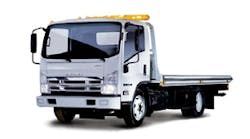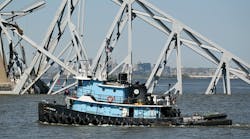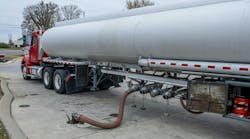According to Yoshinori Ida, president & representative director of Isuzu Motors Limited of Japan, the 2008 Isuzu N-Series newly introduced in the U.S. represents “the best product” the truck maker has ever rolled out.
Ida recently discussed with FleetOwner the OEM’s plans for the North American truck market, including the launch of the new low-cab-forward line.
See Isuzu unveils new N-Series.
Ida has held his current position with the company for more than six years. His service to Isuzu goes back much further, however. He first joined the company in 1966 and worked in a number of capacities, including director of the company’s Advanced Engineering Center, before assuming his current leadership role.
FleetOwner spoke with Ida about Isuzu’s plans and the trucking industry in general:
FO: Why did Isuzu decide to introduce an entire new product line now, in 2007?
Ida: Why now? Because we could not do it at any sooner. We wanted to redesign the N-Series earlier, but we had to delay it because of financial issues. All together, we spent 75 billion yen [more than $600 million] in total on this project. It is the best program, the best product, we have ever done.
Are there vocational applications of particular interest to Isuzu for the new N-Series?
Back home in Japan, Isuzu is very prominent in the refrigerated and temperature-controlled market. Because of that strength, we have over 60% of the retail convenience store business in Japan. We are also very strong in home delivery. These are two areas where we see greater opportunity for growth in the U.S. market as well.
Does Isuzu have any plans to expand into the Class 8 market in the
U.S.?
We have no immediate plans to enter the Class 8 market. Our own strengths are in medium-duty trucks and the Class 8 marketplace in North America already has a number of strong manufacturers. This does not mean, however, that we lack the engineering abilities to develop a Class 8 product line should we choose to do so.
Are there still differences between developing vehicles for the U.S. market and elsewhere in the world? Or is the truck market truly becoming global?
Regulations concerning safety and vehicle emissions vary slightly from country to country; that means harmonization is an issue here. We cannot really have simultaneous product development for all markets. We could do [so] better and faster if regulations were more harmonized worldwide. So our approach, naturally, is to work to the highest requirements in product development. For example, in 2010 the U.S. emissions requirements will be the most stringent.
Does Isuzu conduct all of its own research and development, or do you work with outside consultants and other suppliers?
When it comes to truly advanced engineering, nobody knows what will become the standard of the future, so we cannot risk looking at only one possible solution. Instead, we have to look at the widest possible range of potential solutions, so we also work with outside consultants and other partners to explore those alternatives.
Is hybrid power the future of trucking?
Hybrids are used quite extensively in Japan due to government incentives for end users. This very specific program has boosted their sales. We understand that no such incentives are offered here. It is our task to drive down the cost of hybrids so that customers can make the choice, but that takes time.
I do not see hybrids as the future of medium-duty trucking, however. In terms of reducing pollution, we see CNG as having more potential than hybrids. There is also a plentiful supply of natural gas worldwide. One of the problems with CNG as a power source in the U.S. is the lack of a fuel delivery infrastructure.




